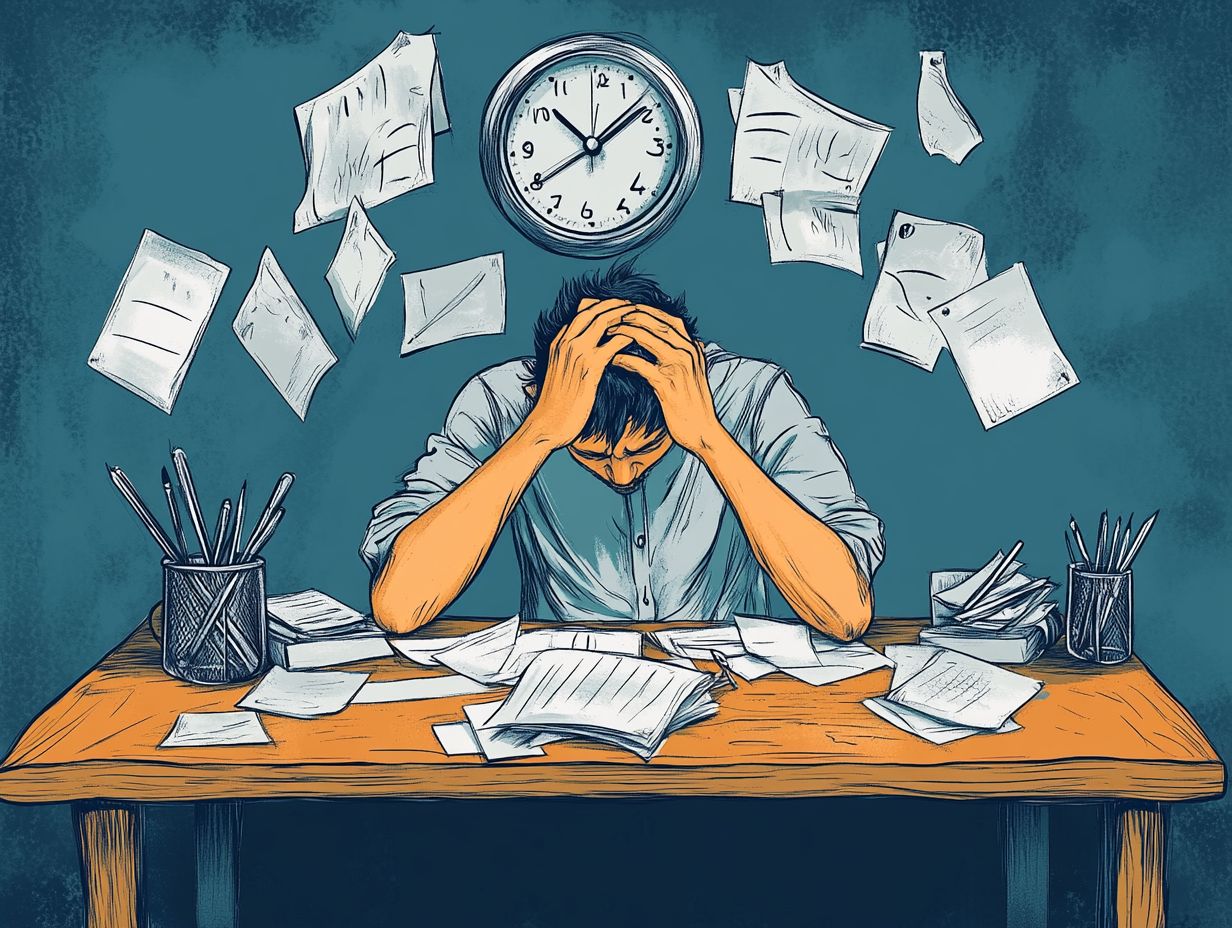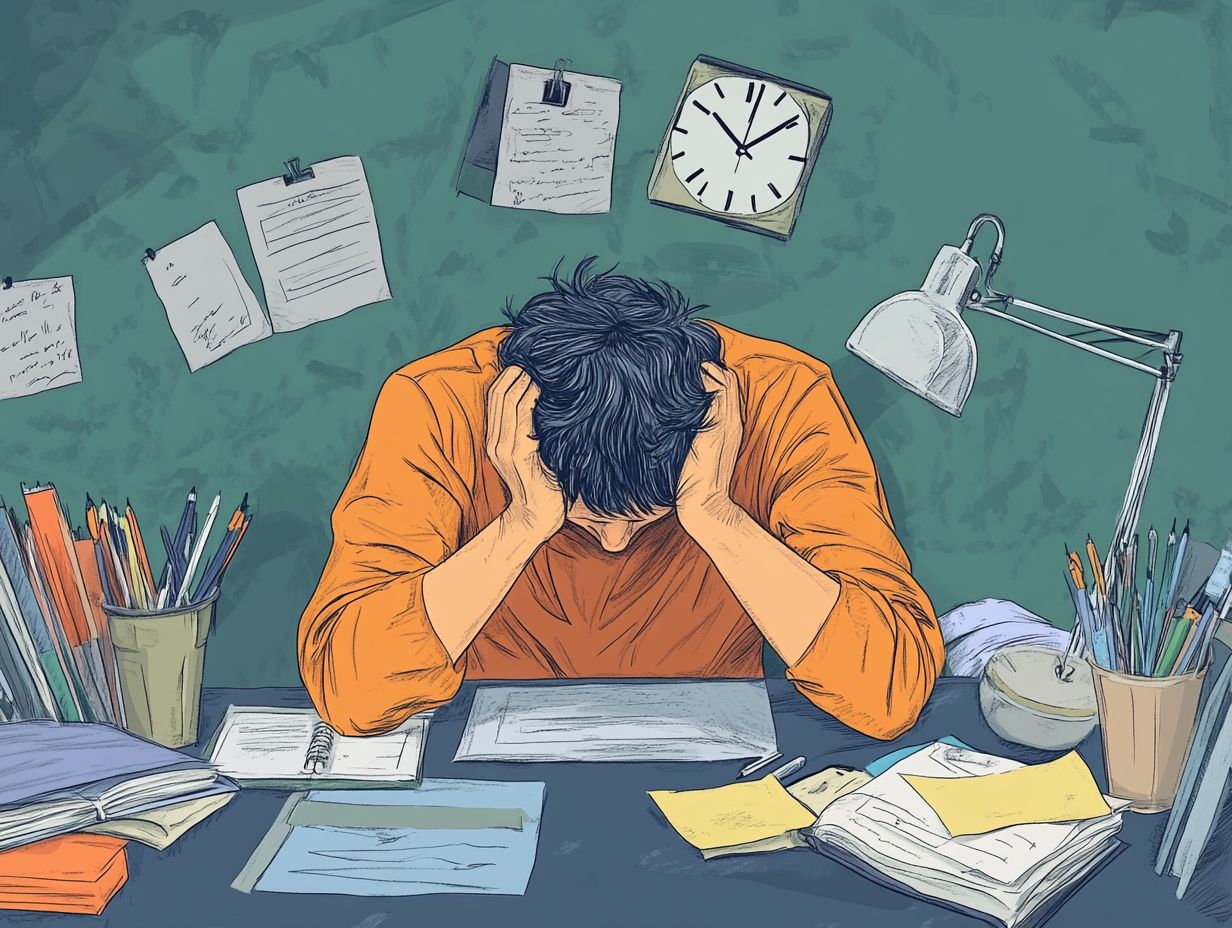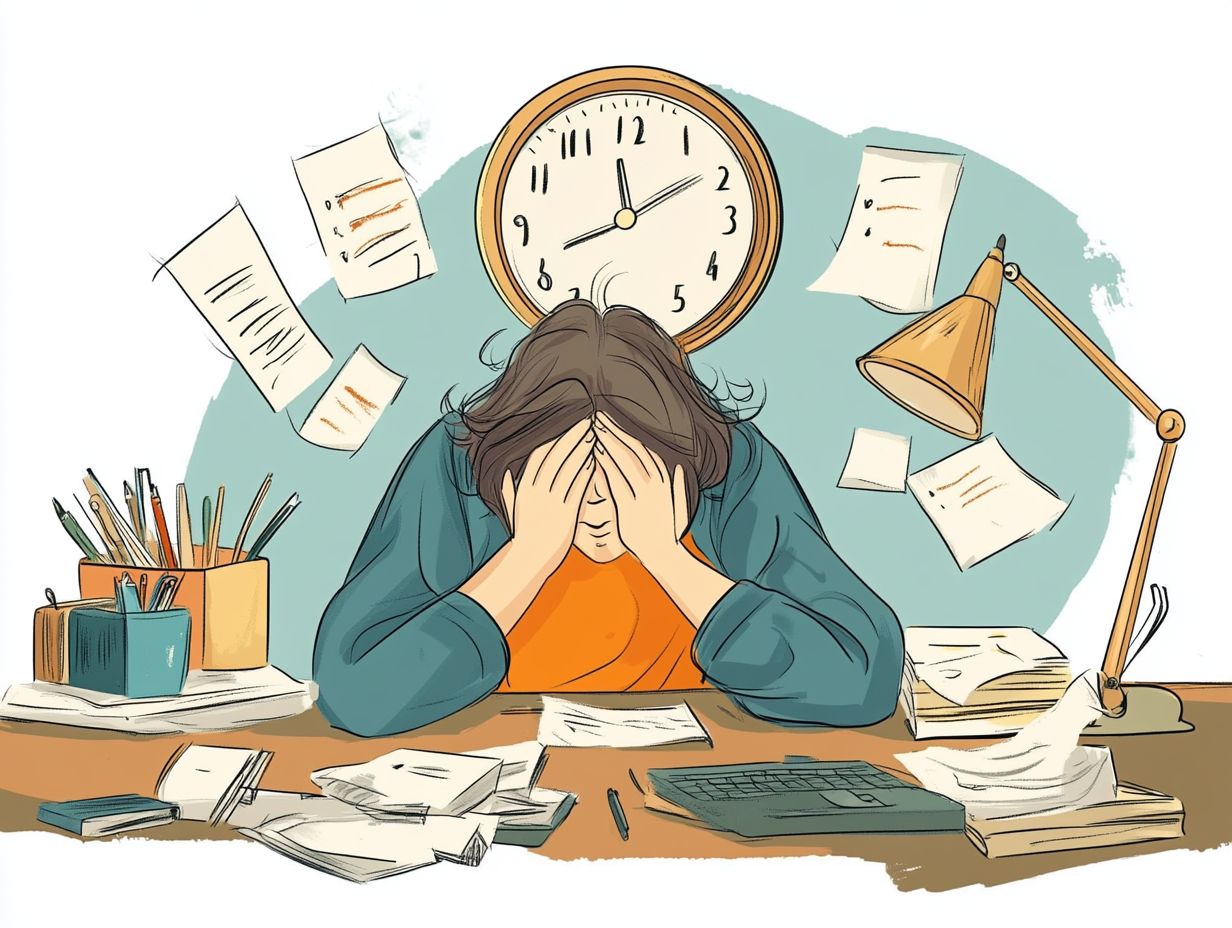The Impact of Procrastination on Your Mental Health
Procrastination is more than just a pesky habit; it can profoundly affect your mental health and overall well-being.
This article explores the complexities of procrastination, examining its definition, underlying causes, and its detrimental effects on stress, anxiety, and self-esteem.
You’ll uncover common triggers that lead to procrastination, along with effective strategies to break free from this cycle. It will also guide you on recognizing when it’s time to seek professional help and emphasize self-care practices to support your mental health while tackling this challenge.
Immerse yourself in this exploration to reclaim your time and restore your peace of mind!
Contents
- Key Takeaways:
- The Definition of Procrastination
- The Link Between Procrastination and Mental Health
- Common Reasons for Procrastination
- Breaking the Cycle of Procrastination
- Seeking Professional Help
- Maintaining Good Mental Health While Battling Procrastination
- Frequently Asked Questions
- What is procrastination and how does it affect mental health?
- Why do people procrastinate and what are the consequences?
- Is there a link between procrastination and mental health disorders?
- How can procrastination impact one’s overall quality of life?
- How can I overcome procrastination?
- Can seeking help for procrastination also benefit mental health?
Key Takeaways:

- Procrastination negatively impacts mental health, increasing stress, anxiety, and low self-esteem.
- Identifying triggers and using effective strategies can improve your mental well-being.
- Seeking professional help and practicing self-care are key to managing procrastination.
The Definition of Procrastination
Procrastination is the intentional act of delaying or postponing tasks while being fully aware of the negative consequences it can have on your mental health and productivity. This complex behavior is often linked to emotional challenges such as anxiety, fear of failure, and low self-esteem, creating a persistent cycle of task avoidance.
Understanding procrastination can unlock new ways to take control of your time! By uncovering its underlying causes, you can open the door to more effective coping strategies and cognitive behavioral therapy</b, which helps change negative thoughts and behaviors.
Understanding the Behavior and Its Causes
To understand procrastination, it’s essential to look at the many reasons that lead to task avoidance, such as anxiety, perfectionism, and deeper emotional issues manifesting as negative thoughts.
These factors create a cycle where the fear of failure or not meeting your high standards leads to avoidance, amplifying those feelings of dread. If you find yourself scoring high on the procrastination scale, you might often push aside essential tasks due to overwhelming anxiety about your performance. Perfectionism can also leave you paralyzed, making it tough to even start what needs to be done.
It’s crucial to tackle these challenges now to regain control! Consider breaking tasks into manageable steps, setting realistic expectations, and incorporating mindfulness practices into your routine. By recognizing and addressing these psychological hurdles, you can take meaningful strides toward conquering procrastination.
The Link Between Procrastination and Mental Health
The link between procrastination and mental health is substantial. Chronic procrastination can elevate your stress levels and intensify anxiety disorders, resulting in feelings of depression that can impact your overall well-being. Understanding the importance of self-care in combating procrastination is especially crucial for university students.
Effects on Stress and Anxiety
Procrastination directly impacts your stress levels and anxiety, creating a vicious cycle where avoiding tasks heightens feelings of pressure and worry. This ultimately undermines your ability to cope effectively and shield your emotions.
When you delay important responsibilities, you intensify the sense of urgency that comes with academic demands. This growing weight often translates into elevated stress levels, making it even more difficult to address subsequent assignments or projects. As your anxiety escalates, your brain’s capacity to focus and engage diminishes, hampering your ability to implement healthy coping strategies.
To break this cycle, it s crucial to adopt practical measures such as:
- Breaking tasks into smaller, manageable sections
- Setting clear deadlines
- Incorporating mindfulness practices
These strategies can collectively enhance your sense of control and bolster your emotional resilience during periods of academic pressure.
Impact on Self-Esteem and Motivation

The impact of procrastination on self-esteem is quite profound. When you consistently avoid tasks, it can erode your motivation and create a negative cycle of emotional challenges. This leaves you feeling inadequate and unaccomplished.
This lingering sense of inadequacy often arises from deeply ingrained self-beliefs that suggest you lack the competence to succeed. Such beliefs can ensnare you in a loop of self-doubt, making it all too easy to push important tasks aside and miss deadlines.
To combat this harmful cycle, you can adopt various motivation strategies. Start by setting small, achievable goals. Engaging in positive self-talk can also be incredibly effective. These techniques can gradually rebuild your confidence and foster a proactive mindset, giving you the power to break free from procrastination and fully embrace your true potential.
Common Reasons for Procrastination
Identifying common reasons for procrastination is crucial for breaking the cycle. Your personal triggers often include perfectionism, anxiety, and other underlying emotional issues that can impede your ability to complete tasks effectively.
Recognizing these patterns allows you to address the root causes, giving you the power to take decisive action and regain control over your productivity.
Identifying Personal Triggers
Identifying your personal triggers for procrastination starts with understanding the emotional issues at play and using thinking tools to recognize and address these barriers to productivity.
By looking into these emotional currents, you can uncover specific situations or feelings that lead you to procrastinate, like the fear of failure or the relentless grip of perfectionism. For instance, you might discover that you often delay writing reports due to past criticism. This pattern can be shifted through changing negative thoughts into positive ones.
Utilizing coping strategies, such as breaking tasks into smaller, more manageable segments, can significantly ease any overwhelming feelings. For example, a student facing a hefty project should set smaller deadlines for research, outlining, and drafting, creating a more structured approach.
These methods not only help alleviate anxiety but also cultivate a more proactive mindset, giving you the power to make steady progress.
Breaking the Cycle of Procrastination
Breaking the cycle of procrastination requires you to adopt effective strategies aimed at overcoming task avoidance. Establishing structured routines, enhancing your time management skills, and utilizing coping mechanisms are essential steps in this transformative process.
Effective Strategies for Overcoming Procrastination
Effective strategies for overcoming procrastination often hinge on motivation techniques and actionable steps. Start by setting short-term goals and practicing self-compassion to nurture a more supportive internal dialogue.
To truly tackle procrastination, break larger tasks into manageable, bite-sized pieces. Each completed step will give you a sense of accomplishment. Establish both short-term milestones and long-term objectives to create a structured blueprint, enabling you to track tangible progress.
As you pursue these goals, remember to practice self-compassion. Acknowledge that setbacks are a natural part of life, helping you maintain your motivation. This approach not only reinforces your resilience but also fosters a more positive outlook when facing challenges, making it easier to return to your tasks without the burden of harsh self-judgment.
Seeking Professional Help

If you’re struggling with chronic procrastination, seeking professional help can be a game changer. Engaging in cognitive behavioral therapy can effectively break negative patterns and enhance your productivity.
When to Consider Therapy for Chronic Procrastination
Recognizing when it s time to consider therapy for chronic procrastination requires a keen awareness of its negative effects on your mental health, emotional well-being, and overall quality of life.
You might often find yourself putting off tasks, only to be met with a wave of anxiety and stress as deadlines creep closer. This cycle breeds self-doubt and frustration, even leading to shame, which significantly impedes both your personal and professional growth. For instance, picture a student who delays studying until the night before an exam, only to be overwhelmed and feeling unprepared.
Therapy is a valuable resource, helping you address the underlying emotional triggers like the fear of failure or perfectionism that fuel this behavior. It allows you to develop healthier coping strategies and break free from the habitual patterns that contribute to procrastination. With the guidance of a therapist using methods that help change negative thought patterns, you can set achievable goals and create structured plans, ultimately paving the way for a more productive and fulfilling life.
Maintaining Good Mental Health While Battling Procrastination
To maintain good mental health while grappling with procrastination, you must embrace self-care practices and coping mechanisms that foster a healthy lifestyle and enhance your overall mental well-being.
Prioritizing these strategies gives you the power to navigate challenges with greater ease and resilience.
Self-Care Practices and Coping Mechanisms
Self-care practices can ease emotional struggles and help you build a structured routine that fosters both productivity and emotional balance.
Incorporating mindfulness techniques, such as meditation or deep-breathing exercises, helps you stay present and reduces anxiety an often sneaky trigger for procrastination. Regular physical activity, whether it s a brisk walk or a calming yoga session, can elevate your mood and energy levels, creating a positive feedback loop that enhances your motivation.
Setting small, achievable goals within your daily schedule can instill a sense of accomplishment, effectively breaking the cycle of overwhelm that often leads to procrastination. By prioritizing adequate rest and nutrition, you can sustain your mental and physical well-being, cultivating an overall environment that encourages focus and diminishes the urge to delay important tasks.
Frequently Asked Questions
What is procrastination and how does it affect mental health?

Procrastination is the act of delaying or postponing tasks that need to be done. It can lead to increased stress and anxiety and can have negative impacts on one’s mental health.
Why do people procrastinate and what are the consequences?
People often procrastinate due to a fear of failure, lack of motivation, or feeling overwhelmed. The consequences can include increased stress, decreased productivity, and negative effects on mental well-being.
Is there a link between procrastination and mental health disorders?
Research has shown that chronic procrastination can contribute to the development or worsening of mental health disorders such as depression, anxiety, and ADHD, highlighting the importance of understanding the cost of procrastination in your life.
How can procrastination impact one’s overall quality of life?
Procrastination can lead to missed opportunities, damaged relationships, and a lack of fulfillment in life. It can also contribute to a cycle of negative thoughts and behaviors, affecting one’s overall well-being.
How can I overcome procrastination?
Some strategies include breaking down tasks into smaller, manageable steps, setting realistic goals and deadlines, seeking support from others, and practicing self-care and stress-management techniques.
Can seeking help for procrastination also benefit mental health?
Absolutely. Seeking help from a therapist or counselor can provide valuable insights and tools for managing procrastination and improving overall mental health and well-being.






